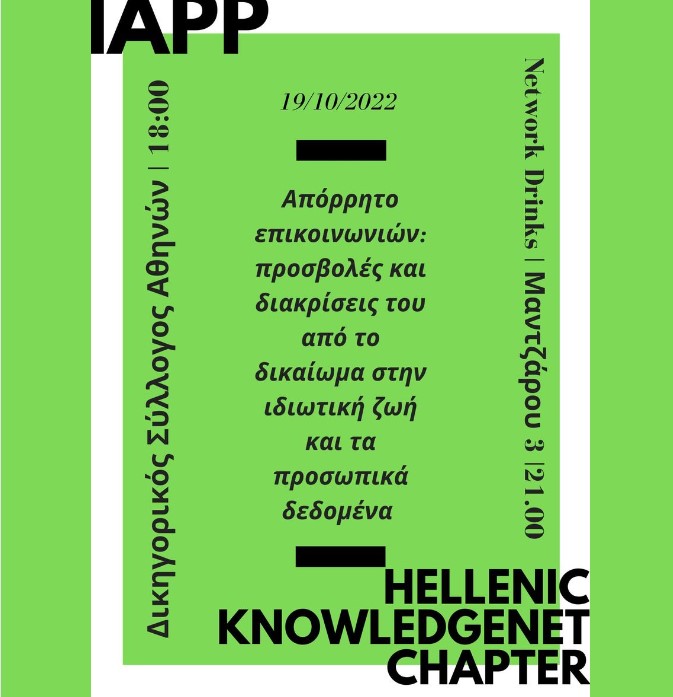The Glass Room Misinformation Edition exhibition that we are co-organizing at the National Library of Greece has just started
The Glassroom Misinformation Edition exhibition that we are organizing at the National Library of Greece opened to the public today.
Visit it daily until Sunday 27 November and come and meet the teams of Homo Digitalis, Ditital Detox Experience and Open Lab Athens!
Opening hours.
Location.
Entrance: completely free
Homo Digitalis' triple participation in IGF Greece 2022 was a great success
On the weekend of 5 and 6 November 2022 we participated in #IGFGreece2022 where we had the honour and pleasure to take part in very interesting discussions about the Internet and Governance in Greece.
Many thanks to Internet Governance Forum Greece for the wonderful hospitality!
Homo Digitalis organizes Workshops at the National Library of Greece in the framework of the exhibition we co-organize The Glass Room
Countdown for the exhibition “The Glass Room Misinformation Edition”
On the first day of the exhibition, Monday 21/11 at 18.45, the Homo Digitalis team will be at the Stavros Niarchos Foundation Cultural Centre to introduce the exhibition and talk to us about interesting and topical issues.
We look forward to seeing you all there!
We bring The Glass Room exhibition to Greece
“The Glass Room Misinformation Edition” exhibition is coming to Greece on 21-27 November at the National Library of Greece to help us acquire a more critical thinking towards technology and its different aspects, to get to know better the devices we use every day, but also to discover what information we share online and with whom.
What happens when we increasingly rely on social media to seek information?
How do we recognise that the information we receive is real?
What data does social media and other applications know about us?
Who has access to this data and how can they use it?
How do we protect our security and privacy?
How does the technology industry and the business models behind it influence our decisions?
In a simple and interactive way we learn how to take back control of our data to protect our privacy and security. The exhibits help us better understand our relationship with technology, critically evaluate the information we share daily through the devices we use, and become more familiar with our apps and devices.
The Glassroom exhibition has travelled to 61 countries around the world, counting 471 award-winning events and more than 350,000 visitors worldwide.
The Glassroom Misinformation Edition
21-27 November
Daily 09.00 – 20.00
National Library of Greece, ground floor
(Stavros Niarchos Foundation Cultural Centre, 364 Sygrou Avenue)
Entrance: completely free
More information about the exhibition.
Created by Tactical Tech
Organized in Greece by Digital Detox Experience , Homo Digitalis, OpenLab Athens
Hosted by: National Library of Greece.
Homo Digitalis with Triple Representation at the Internet Governance Forum Greece 2022
Tomorrow Saturday and the day after Sunday we will be at the Internet Governance Forum Greece at OTEAcademy – the conference starts tomorrow at 10:00!
Book your place or register to attend online here.
-Stefanos Vitoratos moderates the panel “Information as Power”.
-Elpida Vamvaka participates on Sunday in the panel “The Power of Policy Making” moderated by Vassilis Vassilopoulos on internet governance and the voice of citizens in emerging governance models.
-Alexandra Giannopoulou is part of the panel “Financial Power”, on decentralised finance.
Homo Digitalis speaks to the PEGA Committee of the European Parliament during her visit to Greece
The European Parliament’s Committee of Inquiry into the investigation into the use of spyware in the EU is in Greece this week!
Homo Digitalis has been invited to appear before it to give evidence on the significant challenges to the rule of law, democracy and human rights. We will be represented at this meeting by the Vice President of the Board, Stefanos Vitoratos.
The Commission of Inquiry will also meet representatives of journalists from InsideStory and Reporters United, who highlighted #Pretarorgate with their investigation, as well as representatives of civil society and political parties, among others.
Homo Digitalis participates in the IAPP Hellenic KnowledgeNet Chapter's event
At 18:00 (until 20:30) the Greek KnowledgeNet Chapter of the IAPP (International Association of Privacy Professionals) is organizing an event at the Athens Bar Association on “Privacy of communications: violations and discrimination of the right to privacy and personal data”. Stefanos Vitoratos will be on the panel discussing an issue that concerns us all.
Detailed information about the event can be found here:
We note that two more members of Homo Digitalis, Melina Skondra (Chaptair Chair) and Stergios Konstantinou (Young Privacy Professional) are among the Greek Chpater leaders of the IAPP (International Association of Privacy Professionals) for Greece.
Our speech at IGF Greece's online event on DSA and digital platforms
Christos Zanganas will represent us on Monday, October 17 at 19:00 in the discussion of an issue we often read about:
What is the regulatory framework that defines the technical and legal measures for a secure and transparent internet?
What is the responsibility of digital platforms and what does the new European legislation of the Digital Services Act (DSA) ensure?
You can register here.
Our speech at BEYOND EXPO in Thessaloniki is available
You can watch Melina Skondra’s recent speech at Beyond Expo on the protection of our personal data and privacy in the workplace and the obligations of employers to comply with GDPR.
Technology should be used in a way that serves people, according to Melina, and we couldn’t agree more! You can watch the relevant clip here (at 44:38).











